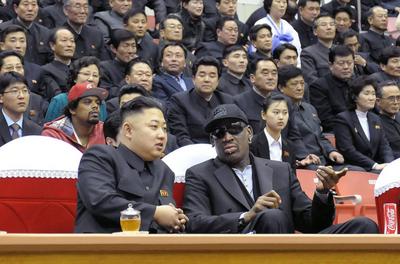Is this meeting just another instance of the controversial, flamboyant Rodman being Rodman, or is there a hidden, more complex agenda woven into his adventure to the DPRK capital?
Should the latter prove to be true, his visit would join a series of unconventional exploratory advances in US–DPRK diplomatic history. Among the earliest were secret meetings in New York that DPRK officials held in 1986 with CIA director William Casey. A few years later, just as the DPRK took serious steps to advance its nuclear program (as both the Chinese and the Soviets normalised relations with the ROK), a State Department official was instructed to speak Korean in a loud voice at a party to attract the DPRK officials also in attendance. In 1994, former president Jimmy Carter travelled to Pyongyang as a private citizen to meet with Kim Il-sung to discuss the DPRK’s nuclear intentions. Of these efforts, those undertaken by the State Department official and Jimmy Carter proved most successful. Both helped to kick-start talks that led to the 1994 Agreed Framework, the first DPRK–US agreement since July 1953, when the two states joined China to sign the armistice that halted the battles of the Korean War.
Up front, Rodman’s efforts more closely resemble those of the Japanese pro-wrestler turned politician, Antonio (Kanji) Inoki, who in 1995 took a wrestling team to Pyongyang with the ambition of improving Japan–DPRK relations. Rodman travelled to the DPRK as a private citizen; there is no reason to assume that he travelled with any blessings or guidance from the US government. Nor does anything suggest he was given written or verbal messages to relay to the young DPRK leader. But if there was more to this visit than Rodman’s private concerns, the timing could not have been better. Since Kim Jong-un was suddenly thrust into his position by the untimely death of his father in December 2011, the young leader has showed signs that his regime might offer a different character. He seems more willing to appear and speak in public than his predecessor. Yet he has also continued to provoke his country’s adversaries by launching a satellite and conducting a nuclear weapons test. The apparent success of these efforts has brought the state closer to completing the sophisticated long-range missile system needed to deliver its dangerous nuclear weapons.
The idea that the Obama administration would tap Rodman for a diplomatic mission is about as absurd as the idea that Rodman could simply arrange a meeting with the DPRK leader without a hint of official backing. But Rodman’s unlikeliness as a diplomat in this situation is actually his strength. Only those with a keen interest in the game would appreciate the talents that ‘the Worm’ brought to the NBA. The league’s ‘bad boy’ scored few points and often looked awkward when taking his shots. To most, he was noted more for his rather unconventional appearance and behaviour. His hair colour changed daily; he once covered up his heavily tattooed and pierced body by donning a wedding dress in an effort to promote his book.
To the serious basketball fan, however, he played a critical, yet less-heralded, role for the teams that hired him. His fearless rebounding and tenacious defending landed him in the NBA’s Hall of Fame. He accompanied his teammates to the playoffs 11 out of his 14 years in the league, and earned enough championship rings to adorn the fingers of one hand. A Michael Jordon trip to the DPRK is a mission, a statement of purpose; a Dennis Rodman trip, if unsuccessful, is easily written off as the eccentric, unpredictable Rodman simply being his wacky self.
As with most other notable visits by Americans to Pyongyang, this trip may also simply fade into history as a mere footnote in the two countries’ long, tumultuous history of diplomatic relations. But with a little creative ingenuity, it may serve as the friendly icebreaker that is needed to edge the two states toward engagement. Kim Jong-un asked Rodman to request that Obama phone the DPRK leader. There is no need for Kim to anticipate this call, at least for now. There is too much groundwork that needs to be done before the two men can start talking. What Rodman’s journey to Pyongyang might bring to the stagnant US–DPRK relationship is an initial trust-developing stepping stone that could potentially bring this goal a little bit closer.
Mark Caprio is Professor of Korean History at the College of Intercultural Communication, Rikkyo University, Japan.

